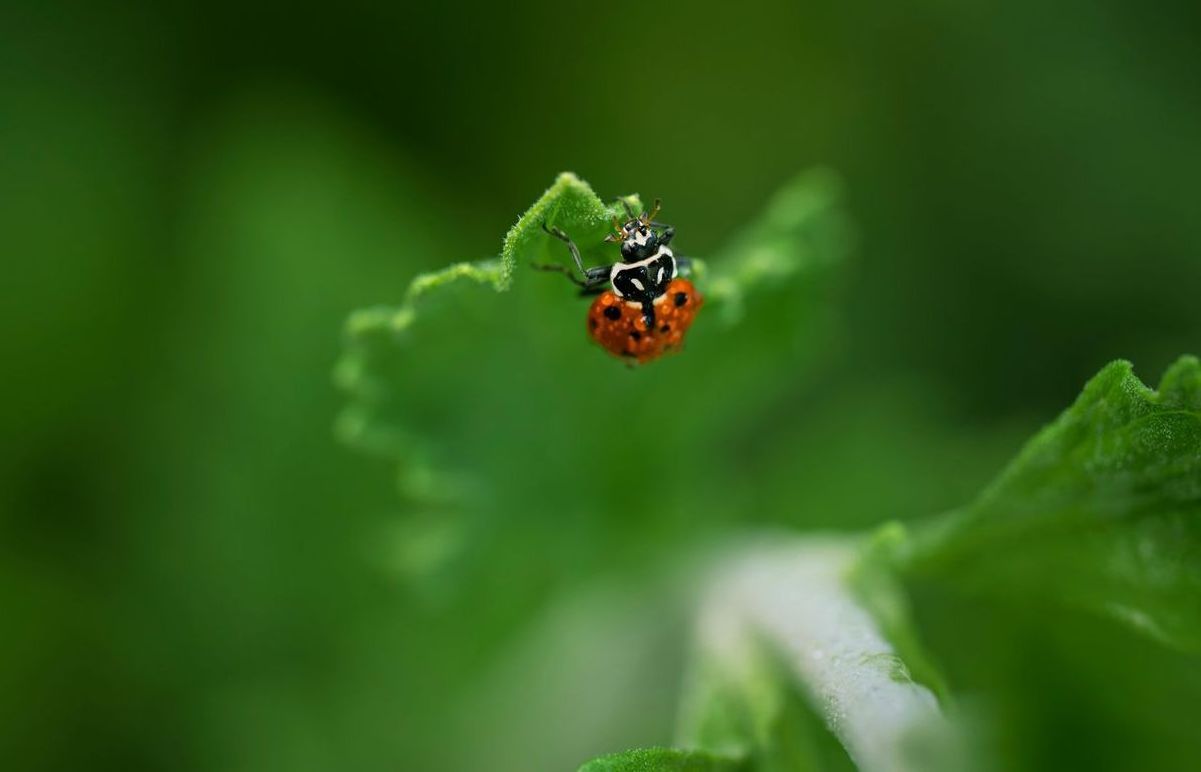Insects: The Unsung Heroes of Your Yard
Insects often get a bad rap, but many of them are actually beneficial for your yard and garden. As someone who's spent countless hours tending to my own little patch of green, I've come to appreciate these tiny helpers. Let's explore some of the insects that can be your allies in maintaining a healthy, vibrant outdoor space.
Ladybugs: The Adorable Aphid Assassins
Who doesn't love ladybugs? These cute, polka-dotted insects are more than just a pretty face. They're voracious predators that can consume up to 5,000 aphids in their lifetime. I remember the first time I saw a ladybug feast on aphids in my garden - it was like watching a tiny, spotted vacuum cleaner at work! Ladybugs are particularly effective at keeping aphid populations under control, which is crucial for maintaining healthy lawns and gardens. If you notice a black, sticky substance on your grass, it might be a sign of aphids. Encouraging ladybugs in your yard can help keep this problem in check.
Praying Mantises: The Kung Fu Masters of Pest Control
Praying mantises are like the martial arts experts of the insect world. These fascinating creatures are unscrupulous eaters, tackling a wide variety of pests. I once watched a praying mantis in my garden perform what looked like an elaborate dance before snatching a moth out of mid-air. It was both terrifying and impressive! Not only are praying mantises effective pest controllers, but they also add a touch of whimsy to your landscape with their unique appearance. They're like living sculptures that happen to be excellent at pest management.
Bees: The Garden's Best Friends
When it comes to beneficial insects, bees are the superstars. These hardworking insects are essential pollinators, responsible for the reproduction of many plants in your garden. Without bees,we'd have a lot fewer flowers and fruits. I'll never forget the summer I decided to plant a wildflower meadow in a corner of my yard. The buzz of activity from the bees was incredible - it was like having my own little ecosystem right outside my window.
Hoverflies: The Bee Lookalikes
Hoverflies are often mistaken for bees, but these striped insects are flies that mimic bees' appearance. Don't let their resemblance fool you - hoverflies are beneficial in their own right. As adults, they're excellent pollinators, visiting a variety of flowers in search of pollen and nectar.But it's their larvae that really shine in pest control. A single hoverfly larva can eat up to 400 aphids before reaching maturity. Talk about an appetite!
Ground Beetles: The Night Shift Workers
Ground beetles might not be the most glamorous insects, but they're hardworking allies in your garden. These nocturnal predators feed on a variety of pests, including slugs, snails, and cutworms. I used to struggle with slugs in my vegetable patch until I learned to appreciate ground beetles. Now, I make sure to provide them with shelter by leaving some leaf litter and mulch around my plants.
Spiders: The Web-Spinning Guardians
Okay, I know spiders aren't technically insects, but they're too beneficial to leave out. Despite their sometimes creepy appearance, spiders are excellent pest controllers. They help keep populations of flies, mosquitoes, moths, and beetles in check5.I used to be terrified of spiders until I realized how much good they were doing in my garden. Now, I see their webs as natural pest control nets, catching harmful insects before they can damage my plants.
Green Lacewings: The Aphid Annihilators
Green lacewings are like the special forces of beneficial insects. Their larvae, often called "aphid lions," are voracious predators of soft-bodied insects like aphids, whiteflies, and mealybugs.To attract these helpful insects, try planting dill, angelica, or sunflowers in your garden. I've found that a diverse planting of herbs and flowers not only attracts beneficial insects but also makes for a beautiful and fragrant garden.
Minute Pirate Bugs: The Tiny Terrors
Don't let their small size fool you - minute pirate bugs are fierce predators. These tiny insects attack almost any pest in their path, making them valuable allies in your garden. I once observed a minute pirate bug taking on an insect several times its size. It was like watching David take on Goliath - and win!
Creating a Haven for Beneficial Insects
To encourage these helpful insects to take up residence in your yard, consider the following tips:
1. Provide a diverse range of plants: Different beneficial insects are attracted to different plants. For example, sweet alyssum, fennel, and tansy are particularly attractive to many beneficial insects.
2. Avoid pesticides: Broad-spectrum pesticides can harm beneficial insects as well as pests. Instead, focus on creating a balanced ecosystem in your yard.
3. Offer water sources: Many insects need water. Consider setting up a shallow water source with pebbles for insects to drink from safely.
4. Create shelter: Leave some areas of your yard a bit wild. Ground cover, leaf litter, and dense plantings provide shelter for many beneficial insects.
5. Plant flowers that bloom at different times: This ensures a constant food source for beneficial insects throughout the growing season.
Conclusion: Embracing the Insect Allies
As I've learned over years of gardening, creating a welcoming environment for beneficial insects is one of the best things you can do for your yard and garden. These tiny creatures play crucial roles in pollination, pest control, and maintaining overall ecosystem health6.Remember, a healthy garden is not a pest-free garden, but one with a balanced ecosystem where beneficial insects help keep pest populations in check. So the next time you see a ladybug, a bee, or even a spider in your yard, give them a nod of appreciation. They're working hard to keep your outdoor space thriving! By fostering a diverse and welcoming environment for these beneficial insects, you're not just improving your own yard - you're contributing to the health of the wider ecosystem. And that's something we can all feel good about.



